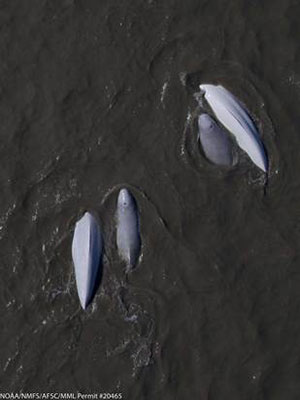Beluga Whale (Delphinapterus leucas)
Are you a pilot that flies over Cook Inlet? If so, we invite you to read this background material (PDF 1,419 kB) and take a short test to see if you have what it takes to be a Cook Inlet Beluga Reporter.
Research
The Alaska Department of Fish and Game (ADF&G) is currently participating in studies of beluga whales in Bristol Bay and Cook Inlet.
Cook Inlet
ADF&G is currently collaborating on an acoustic monitoring project in Cook Inlet to evaluate seasonal habitat usage by belugas. Additionally, we are using existing data sets, including a photo-identification catalog and samples collected from stranded belugas, to build a population model that will explore factors that might be limiting recovery. Samples from stranded whales are also being examined in the laboratory using a technique called stable isotope analysis where we look at annual grown layers in teeth. This will provide a lifelong record of the general diet for individual whales. A large genetic data set collected from a healthy population of belugas whale in Bristol Bay is being used to help us understand social structure within a beluga whale population which might provide insight into why belugas in Cook Inlet are not increasing.
For more information on beluga research see Beluga Studies in Cook Inlet.
Bristol Bay
ADF&G scientists are using satellite tags to monitor year-round movements of belugas and determine which habitats are most important to them. We are also conducting health assessments to obtain baseline data for a healthy, increasing wild population. This information can be used to monitor the continued health of this population in the future or to compare to other populations to determine potential threats. Another beluga research project in Bristol Bay is a genetic capture-recapture study. The results from this research will be used to estimate population size and may provide other valuable information.
For more information on beluga research, see Beluga Studies in Bristol Bay.


